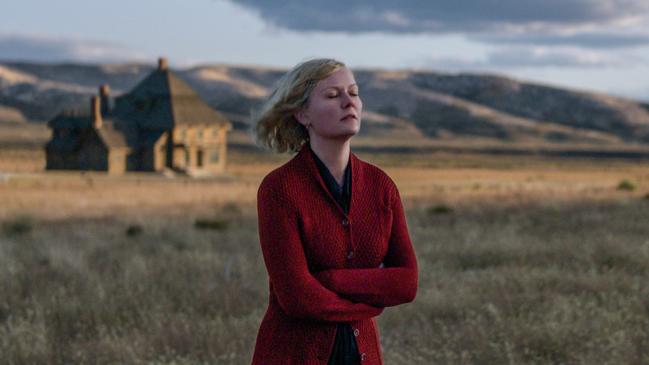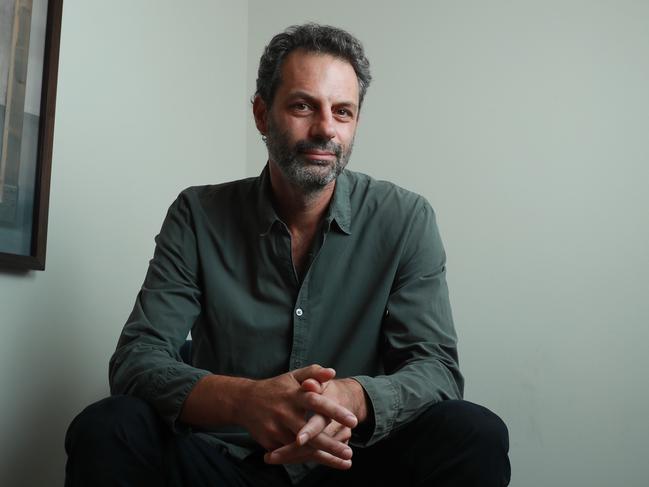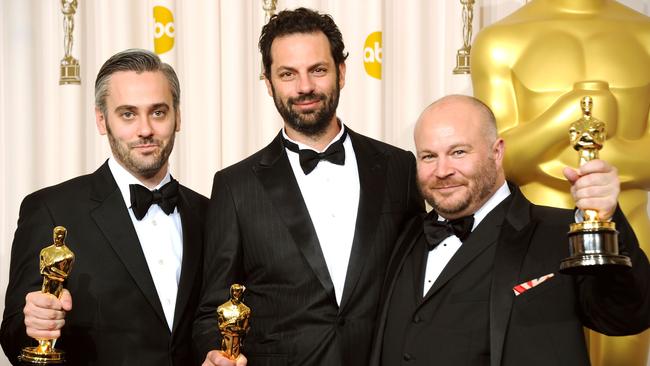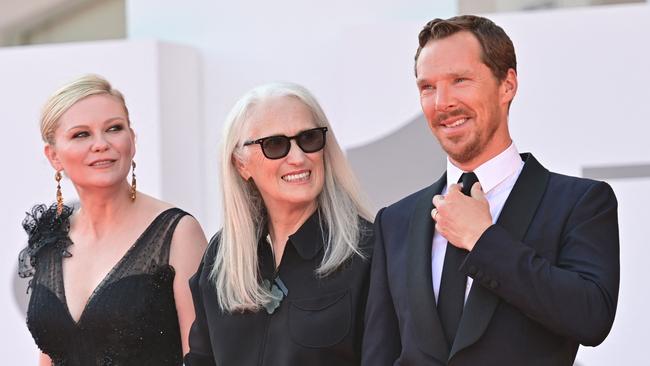Emile Sherman and the rise of a film powerhouse
With a second Oscar in his sights, Emile Sherman talks about the shift to the small screen and finding his ‘voice as a producer’.

Emile Sherman will be back at the Oscars on March 27, and this time he’s hoping to enjoy it. The Australian is one of the producers of Jane Campion’s The Power of the Dog western, which has received 12 nominations, more than any other film, and is the betting favourite to win Best Picture. The ceremony will take place in the same auditorium on Hollywood Boulevard where he won an Oscar for The King’s Speech back in 2011. “I spent the whole time terrified,” the 50-year-old recalls now, sitting on a couch in his Sydney office. “Part of me didn’t even want to win, because the idea of going up there was so daunting.”
The producer’s credits include Lion – another Oscar nominee – as well as television series such as Top of the Lake, which began the partnership with Campion. He met his London-based business partner Iain Canning when they worked together on Candy, starring Heath Ledger, in the mid 2000s.
The two formed a company, See-Saw Films, shortly afterwards, and The King’s Speech – ironically, a film about an Australian and an Englishman working together – became an international hit only two years later.
The pair’s production house has been a powerhouse ever since, with offices in London and Sydney and a corpus of films with a certain pedigree, made by acclaimed filmmakers and for adults. The brand, as they say, is strong, though Sherman also describes See-Saw as a “broad house” capable of producing varied work. That description seems apt; there’s something of an atelier atmosphere to his Paddington offices. Spread across two buildings on a leafy residential street, See-Saw is both a business and creative hub. When The Australian visits, Sherman is working in his second-floor office while writers like Nakkiah Lui and Andrew Bovell preside over rooms downstairs, mapping out television shows on whiteboards.

Sherman never imagined any of this, or even a career in showbiz. He completed an arts-law degree at UNSW that lasted seven years (he enjoyed the arts more than the law), and afterwards a friend asked him to help set up a small independent film, 2000’s Sample People.
Though he knew nobody in the industry, Sherman was able to exercise a business savvy that had been fostered by his father Brian, who established a fund management company after migrating from South Africa when Sherman was four. Brian became one of the film’s investors, and his son’s understanding of contract law made up for his on-set inexperience. One of the actors in the film was a young Joel Edgerton, who has since remembered the tyro producer as a “sweetheart”.
What followed was a series of comedies that – by Sherman’s own admission – flopped. And it was only when he started backing the kinds of films that he might actually want to see himself that his fortunes changed. “I hadn’t used my body as a barometer, which one needs to do. When are you moved? When are you excited?”
Candy was followed by Disgrace, an adaptation of the J.M. Coetzee novel that nodded to his South African roots. And “those were the films that ended up selling and having theatrical distribution around the world. They were still limited and arthouse. But that’s where I felt like I started to find my voice as a producer.”
The film that solidified that voice was, of course, the story of another man finding his. And getting The King’s Speech made was almost as torturous as George VI’s speech lessons. “I remember one weekend, there was a lot of heat around that project. And I said to my wife – we’d gone and seen a movie in Newtown – and I said afterwards, I think we’ve got to move. It was Friday. I said, I think we gotta move to London on Monday. It was the moment to pull it together, and I couldn’t do it from Australia anymore. I was on calls all night – it was too hard.”
Emile and his wife Caroline, a textile designer and philanthropist, now live in Clovelly with their three sons. Back then they had two – aged 2½ and 6 months – and they came along when the couple moved to England.
Sherman made the crucial decision to finance the film independently rather than through a studio, and it paid off handsomely when the $15m drama grossed more than $400m worldwide.
The King’s Speech paved the way for shows like The Crown, and might well have become a series itself had it been made just a few years later. The industry has undergone a fundamental realignment since 2010, with streamers supplanting studios and adult dramas missing in action at the multiplex, muscled out by superheroes.

Those kinds of medium-budget films are Sherman’s bread and butter, of course, and he remains adamant that there’s still a market for them. What’s shifted is how people watch – and who is footing the bill. The Power of the Dog is a Netflix film, and its star, Benedict Cumberbatch, has bemoaned the film’s brief theatrical run.
But the rise of streaming has also solidified the cultural dominance of TV, and Sherman estimates that See-Saw in 2022 is 70 per cent focused on the small screen. “Our company now is built around television,” he says flatly. Last year the company released The North Water, a limited series starring Colin Farrell as an evil whaler in the Antarctic. And Slow Horses, a spy drama starring Gary Oldman, arrives next month. Sherman is a big believer in the effect of technology on storytelling.
“The shift from episodic television to cable to streaming has affected the sort of shows that get made. For the better, in large part, because you don’t need to hit that middle ground; you can be distinctive. And it’s been a training ground for a lot of writers and directors to do more distinctive, interesting work.”
Those up-and-comers include multi-hyphenates such as Michaela Coel (I May Destroy You), whose parents migrated from Ghana to the UK, and the push for more diverse storytelling is one of the signature trends to emerge in the years between The King’s Speech and The Power of the Dog. Those two films, like many produced by See-Saw, are period dramas with predominantly white casts, but inclusivity increasingly factors into the company’s decision-making, according to its co-founder.
“It really has shifted,” says Sherman, “like the world shifted.” Films like Lion might have highlighted inequity, but “the storytellers were often white men, and that has shifted. Obviously working with Steve McQueen a number of times, as a Black Englishman, to Warwick Thornton, as an Indigenous Australian. And a large number of Indigenous Australian writers on (outback vampire show) Firebite.” He points to the company’s work with women, too, such as Kitty Green (The Assistant). More than half the directors at this year’s Sundance Film Festival were female, and “the lens of social justice has shifted,” according to Sherman, “from the stories to the storytellers – and it’s unearthed a lot of really wonderful storytellers.”
Opportunity is everything, and Sherman admits he’s become more conscious of his own privilege as that word has become ubiquitous. These days questions of representation don’t just influence what gets made, but its reception – another thing to be weighed when packaging projects. Sherman takes it on a case-by-case basis. “If Firebite didn’t have an Indigenous storyteller at the heart, I don’t think it could be made in the landscape today,” he says. “It feels like to tell an Indigenous vampire story, you need an Indigenous voice driving it.” On the flip side, Jane Campion brings an outsider’s perspective to the highly masculine world of a cattle ranch in The Power of the Dog, and “whatever she tackles, she’s finding an interesting voice on (it). But there’s no doubt that who tells the story is part of the narrative of the movie and TV series now. Whether it should be or not.”
These questions, Sherman says, are discussed on an upcoming episode of his podcast Principle of Charity, about the vexed issue of cultural appropriation. “Do we have the right to tell stories about characters and cultures that we’re not part of? Where do we draw the line?” Debating the topic is ABC broadcaster Daniel Browning and Canadian philosopher James O. Young. “James takes the view that, in many circumstances, it is fine to appropriate, and it is morally acceptable. Daniel finds it incredibly problematic. And we have a great conversation about it.”
Sherman’s upcoming films include reunions with Colin Firth on WWII yarn Operation Mincemeat (in cinemas in May) and with Joel Edgerton on The Stranger, directed by Top of the Lake star Thomas M. Wright, which could be destined for Cannes (“watch this space”). The Stranger is about the largest undercover police operation in Australia’s history, and “what it is to live a lie, and the toll it takes on you”.
First, though, he has to get through the strange, tumultuous odyssey of awards season. Frontrunners usually come under fire at some point in the race, and veteran actor Sam Elliott, star of several westerns, recently accused Campion of, well, cultural appropriation. “What the f..k does this woman from down there – she’s a brilliant director – know about the American west?” he asked. Campion’s response was that “the west is a mythic space, and there’s a lot of room on the range”.

Elliott might not be a fan, but critics have raved – even if the film’s makers are more circumspect. Campion herself has said that The Power of the Dog isn’t perfect, while Sherman recently admitted that some people have been confused by the film’s plot. It can be difficult, the producer says, to be objective about one’s own work. He describes editing as “a very complex process, where you get very worn down and tired from seeing so many cuts”. Test screenings are important because you get to watch the film through other people’s eyes, as if by magic. “It’s very painful at times, but hugely valuable.”
Painful, too, was shutting down the film’s production in New Zealand at the onset of the pandemic. Sherman describes the last couple of years, with production schedules in limbo, as “really, really scary”. See-Saw employs 35 people across two continents, after all.
Awards buzz has been a nice consolation prize, but his attitude to all the hoopla is as measured as one might expect from a veteran of the circus.
“As we know, happiness or excitement seems to take up less time than worry. So we celebrate and are excited by this. And then you quickly turn to the other 37 problems in the company, and the fires you’re fighting. And you get on with the day.”

To join the conversation, please log in. Don't have an account? Register
Join the conversation, you are commenting as Logout